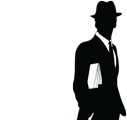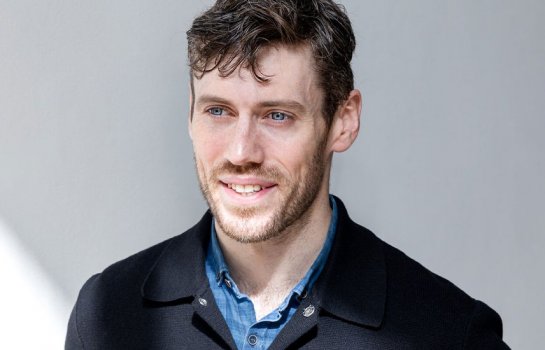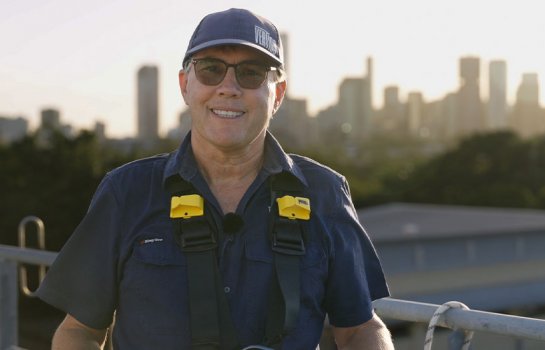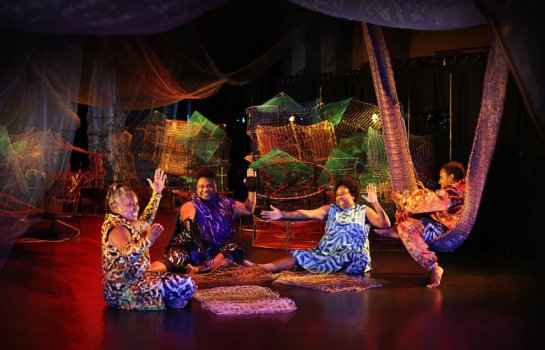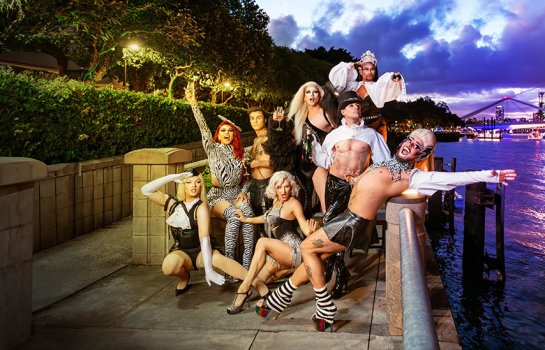Gavin Webber, Choreographer and performer, Stunt Double
Humour is like a kind of propaganda. We want you to laugh, but we want you to also question what you’re laughing at.
Choreographer, teacher, director, performer and one of the founding members of professional dance-theatre collective THE FARM, Gavin Webber has dedicated his life to his art. Throughout his career Gavin has worked between Australia and Europe on a number of theatre, dance, circus, film and installation works, including recent immersive dance-theatre experiences Hold me Closer Tony Danza and Break. As part of this year’s Brisbane Festival, Gavin will be showing off all aspects of his artistic repertoire for The Farm’s newest production Stunt Double, showing at Brisbane Powerhouse from September 6–9. We spoke to Gavin about his upcoming show, creative process, artistic inspirations and what he likes to do in his free time, when he’s not performing on stage or directing behind the scenes.
We’d love to start right at the beginning of your love of dance and theatre – can you recall the moment when you sensed an inkling of affection for performing arts?
The first recollection that comes to mind is my grandmother sitting in her chair facing the TV. In my mind it’s black and white, but that could be wrong. I am standing watching from behind her recliner, as a man dressed in tights flies through the air on a stage. I think it’s Nureyev. I might be making this up, but I think she says that over her shoulder when she realises I am watching. I don’t care who it is, I am hooked. A second one is that as a teenager I became obsessed with Jesus Christ Superstar. Maybe it was my other Grandmother’s (a lot of Grandmothers in this) open heart of Jesus on her living room wall. She was devout Catholic and it was graphic, a horror painting of Jesus with an exposed heart and a crown of thorns, blood cascading down his face. At home I started listening to my father’s double album of the original JCS movie soundtrack and playing out all of the parts. I would be both Pontius Pilate and Jesus, switching back and forth between them, looking down and asking “Who is this broken man?”, then dropping to the floor to respond with a rock and roll wail. I would be Judas, Jesus, Mary, one after the other, even an apostle crying out weakly “Hey, cool it man.” I didn’t know what I was doing but I couldn’t stop. I was living in the imagination of a world, experiencing rock-opera sized emotions and playing them out for myself. Now I get to do that for a living. My last inspiration was early Jackie Chan movies. My brother and I started going into Chinatown when I was about 14 in Adelaide. I’d been a Bruce Lee fan as a kid, but Jackie Chan was the one for me. He was always vulnerable and fragile, running away. He was funny, and he used his environment in fascinating ways. It really sparked my imagination and has remained an influence. I still love him.
You co-founded the contemporary dance-theatre company The Farm, which has developed a number of works including the premiere production Stunt Double. What was your objective in starting The Farm?
We created a company in order to have company. The Farm is a collective, run by four Artistic Directors – me, Kate Harman, Grayson Millwood and Chloe Ogilvie. We are artists who like to share our influences and inspirations, and everything we make is in collaboration. We often work without a director because the show itself is the boss. We feed it, listen to it and respond. It’s like raising a child, or more accurately some weird animal you keep in the dark and raise up until it’s time to take it out on a leash and show it to the world. The company formed on the Gold Coast in 2013, but its roots go way back. We’ve been making shows in collaboration for more years than I care to mention, but our objective in creating The Farm was to nurture the long terms careers and objectives of artists. For a long time, often to our detriment, we worked without much admin or marketing support, we spent every penny on art and artists. Now we are becoming more established as a company, but at the heart of everything is our dedication to our art. That may sound simplistic, but in this day and age when there’s a lot of talk as art as a business enterprise, you have to fight to remain courageous and experimental. We love to entertain but we also want to challenge ourselves artistically. That’s why every show looks different. It’s a difficult thing to market but an ethos that sustains us and all our collaborators. It’s a courage we share because it’s much easier to take risks together. None of us want to be alone.
Stunt Double is making its world premiere at Brisbane Festival on September 6, can you shed some insight into what the audience can expect from this performance?
There’s the wonderful chaos of a B-grade action film set, with audience members fulfilling roles and learning on the job, stars stepping out of wardrobe into the limelight, and stunt doubles being used and abused. It’s dance, theatre, film and obviously stunts. It moves between form and genres, from a character driven ‘reality’ focused on the processes that support the on set hierarchy, into dreamlike sequences that exist somewhere between David Lynch and Alfred Hitchcock. It’s fun and epic. Sometimes it seems like the guy from Wolf Creek is dancing like Fred Astaire or you’re watching a scene from Being John Malkovich that transforms into a car chase from Mad Max. There are doubles, and doubles of doubles. Audiences will leave exhilarated by the show but with something much deeper to ponder. It’s definitely a big meal to digest but we promise it comes with dessert.
Stunt double shines a light on the sexism and hierarchy of the film industry in 70s Australia. Why did you choose to highlight this particular topic?
We’re only using the film industry and the act of filming as a metaphor for our culture’s glorification of the individual and how ‘the many’ are sacrificed for the glory of ‘the few’. It’s our 99 percent moment and we’ve picked the 70s because it was a time of optimism in Australia, when it seemed like things were going to change. But we’re asking the question, has anything really shifted? And if it has, for how long? We’re not being negative, we just want to point out that if the mechanisms of injustice remain, unfairness will too, and that we’re all complicit in some capacity. The hierarchy of a film set works because there is an urgency around the capture of a scene that values efficiency over fairness. Plus there’s just some beautiful ego interactions as everyone vies for their moment in front of the lens. The camera has a predator quality to it in our production, it’s always hunting and sniffing blood and there are plenty of poor souls being sacrificed at its altar. We’re putting this particular world under a microscope but what we’re talking about is much broader. It’s the world we live in. The actions and deeds of the inflated egos we put up on stage are our own, subverted, manipulated for laughs maybe, but it’s definitely us we’re talking about.
Humour has featured in many of your works – how does it play a role in the narrative of Stunt Double?
That’s an easy one! Stunt Double is funny and the laughs are entertaining, and in that way they are a deliberate distraction from the truth. I’ve heard there is a second Amazon River that flows underground, equally big, beneath the top one. This show feels a bit like that. The top is distracting, full of entertaining bits, gags and stunts, but underneath, that’s where the shit really hits the fan. It’s like there are two shows at once, the surface level, where scenes are being played out and another show bubbling under the surface, occasionally rearing its head but always simmering beneath and carrying a larger truth. Humour is like a kind of propaganda. We want you to laugh but we want you to also question what you’re laughing at. We all get seduced by the glamour of what we’re watching but sometimes what seems funny is not funny at all and we love to play with the edge of that particular knife.
Can you talk us through the creative process of developing a show like Stunt Double?
It was a beast of a work to make but it started with five people talking over zoom during Covid lockdown. The idea had been brewing for years but when we finally decided to commit we started brainstorming ideas together. We decided to make it as a group and to attempt to incorporate all of our viewpoints regarding power and privilege into this show. We are a diverse group too, ranging in ages, experiences, star signs, everything, so there was a lot to discuss. Then at a certain point we stopped talking and entered the rehearsal room, still with no director, but with clear goals. A script was developed, which I wrote but which was developed collaboratively through our improvisations and creative developments. And it never really read like a proper script anyway because it described movement sequences, moods, illogical and improbable ways of dealing with the subject matter. The group of people feeding into this collaborative process kept increasing but it was always driven by our company’s core artists working closely together. Our first time working from a script was matched by our first time developing a work in three parts over three major developments. We took turns stepping out to create different sections and then when we got closer we relied on our designers to become our outside eyes, feeding back in and giving notes. We kept expanding and relying on each other and attempting to create a ‘snowball effect’ where the show itself tells us what it needs and we are all responsible to it. Our collaborators and partners supported us. Our producers Performing Lines put together a crack production and management team and our partners, Brisbane and Darwin Festival, emboldened us and kept believing. They say it takes us a village to raise a child, and this was a hell of a big baby.
You are also a performer in the show. What do you love about having the creative freedom to be on stage as well as work on the big-picture production side?
That’s an interesting one. It’s frustrating and enlightening at the same time. When you’re performing you feel a work from the inside, so your experience of it is different. Personally when I’m involved in making a work, I don’t try to impose myself onto the show, I look to the show to dictate terms. Sometimes that’s easier from the inside because you are a part of the world you are creating, you can push things forward without having to try to explain first. That leads to a more intuitive creative process. But it has its impacts too. It becomes more difficult to fine tune what gets made and you lose your objectivity. So it’s a constant dance of intuition and logic, dissolving yourself into the work, stepping away, watching a video after a day off, talking to the designers, the dramaturg, the other collaborators. It’s complex and overwhelming but fortunately I love it and I’ve been dancing for a long time now.
What do you hope the audience will take away from the show?
We hope they will have a wild and thought provoking ride. We hope they will go home exhilarated by what they’ve witnessed and that the images and ideas will remain with them, seared into their retina, on constant playback over the next few days. Early on in our creative careers we produced a show called lawn with The Brisbane Powerhouse. We toured it a lot in Germany and Australia and I remember after one Berlin season someone coming up and saying they loved the show but (they said this bit apologetically) they “found it entertaining”. Quite a lot of people reiterated this sentiment, a particularly German response to the idea of entertainment. They said they enjoyed the show so much they wondered if it was shallow, but then the ideas and images remained with them for days so they realised it was actually very profound. I think Stunt Double is like this, deceptively entertaining, purposefully playful. A show that storms over you like a riveting action sequence and leaves you gasping for air as the real reason for its existence lands and stays with you.
Aside from choreographing, dancing, creating and performing, what do you like to do to unwind in your free time?
The best is nature. Bushwalking and hiking. Swimming in waterfalls. We’ve just concluded our Darwin season and yesterday a bunch of us headed out to Litchfield National Park. We swam in waterholes that had ambiguous crocodile warnings, walked through dry savannah and had a picnic by some beautiful rock waterholes that looked like God had decided to home renovate. Performing is a dance with your own ego, so for me it feels good to go places where you don’t matter one bit. Where you could end up as a remnant dinosaur snack, or wander off into an arid landscape and die of thirst. Soon I will fly home and see my son, who I haven’t played with for over a week. He always reminds me that there are other things in life, other places to be, other factors. I get obsessed when making a work so it takes something like a 9 year old’s enthusiasm, love and attention to get myself out of my head.
Stunt Double is showing at Brisbane Powerhouse from September 6–9, as part of Brisbane Festival. Head to the Brisbane Festival website to grab your tickets.
